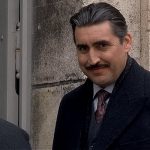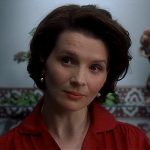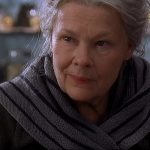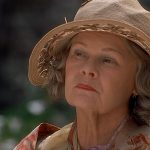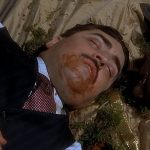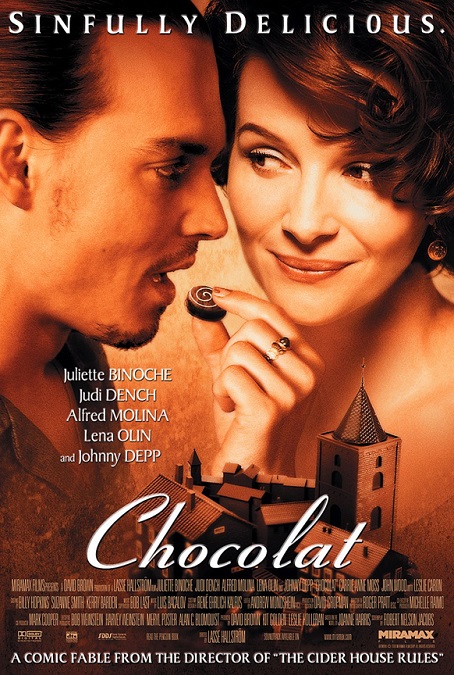
Chocolat – 2000
This was a fun, light-hearted, comedy. The humor was subtle and sometimes hard to find, but it was certainly there. I had seen it many years ago when it had first been released in theatres, and I remember that I was rather ambivalent about it. It was good but not great, cute but not deep, romantic but not passionate. Upon this, my second viewing, I am going to have to revise my opinion. It was a very cleverly written script with some pretty spot-on casting and acting.
Chocolat was a French film, though the dialogue was in English. It stars Juliette Binoche as Vianne Rocher. She is the mother of a six year-old girl named Anouk, played by Victoire Thivisol. The two of them are shown to be wanderers. They have a history of traveling from place to place, town to town, country to country in search of a home in which to stay. The film begins as they arrive in the secluded little French village called Lansquenet-sous-Tannes.
The village is the kind of place where everybody knows everybody’s business and secrets are hard to keep. Alfred Molina plays the town’s mayor, Comte de Reynaud. He is a man who believes in righteousness through self-denial. He is strict with the people of the town, but is even stricter with himself. So when Vianne and Anouk arrive and open up a chocolate shop at the beginning of the Lenten season, he immediately sees her as an enemy of his way of life. Vianne is such a master of chocolate confections that she begins to seduce the townsfolk into sins of indulgence.
There’s the set up. But what made the film utterly charming is the way it was portrayed as a kind of fairy tale. There is a woman narrating throughout the movie, speaking as if she is reading from a story book. To further enhance the fairy tale feel of the narrative, a plot device is introduced which explains Vianne and Anouk’s constant roving. As the tale goes, the two have always been compelled to follow the north wind. It was the wind which directed them to the town, and when it turned, they would know it was time to move on. And it was taken even deeper, developing its own history and mythology, explaining why they were fated to follow the wind and in the end, it was also explained how the cycle was broken so they could end their nomadic existence.
But the film was so much more than that. There were serious issues that were addressed, though in a simple and light-hearted way. The town, under Comte de Reynaud’s unbending leadership and strict moral code, was repressed. There was no joy and little happiness, though it seemed that the people were longing for release. So really, the movie was about how Vienne, through her non-conformist ways and her exotic chocolate creations, brought life and love to the villagers.
There were two women who she befriended. The first was Armande Voizin, played by Judi Dench. She was the estranged mother of the mayor’s secretary, Caroline, played by Carrie-Anne Moss. The second was Josephine, played by Lena Olin, the abused wife of Serge, played by Peter Stormare, a violent drunkard. Vianne’s chocolate seems to take on a magical quality. It heals hearts, restores relationships, awakens old passions, and encourages new ones. And behind it all is Vianne’s beautiful, easy smile.
The final player in the little fairy tale is the wandering river rat, Roux, played by Johnny Depp. He is an Irishman who takes a liking to Vianne and Anouk. He roams the land like a gypsy, and he and his folk are treated with utter distain by the uptight and repressed townsfolk. Of course, Vianne falls to his heavy handed charms, but their romance was almost extraneous to the plot.
The movie was delightful and had a feel-good ending. The bad people were either driven away or became good. Even the Mayor relents after he loses control and gorges himself on a chocolate window display. The good people became happy. And the North Wind finally lost its hold on Vianne and her daughter, allowing them to put down roots in the little village. And like all fairy tales, there was a moral lesson to be learned, and it was clearly stated by the village priest during his Easter sermon, and I think part of it is worth repeating here. “Listen, here’s what I think. I think we can’t go around measuring our goodness by what we don’t do. By what we deny ourselves, what we resist, and who we exclude. I think we’ve got to measure our goodness by what we embrace, what we create, and who we include.” It is a message that is both good and true.
I have always though Juliette Binoche was an absolutely gorgeous woman. Her flawless features have a very European quality. Her acting was wonderfully gentle, and I liked the on-screen chemistry between her and Anouk. But Judi Dench was also incredible, as always. I should also mention the spectacular production design, which, to my surprise, was not even among its five Academy Award nominations. Unfortunately, it didn’t take home any Oscars.

